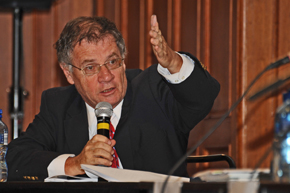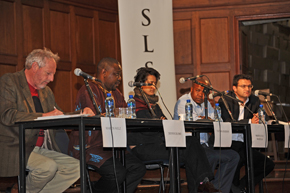Protection of Information Bill comes under fire
16 September 2011 | Story by NewsroomIt was a bit like watching Parliament live at The Great Debate on 15 September, the final instalment in a programme of events - the Protection of Information Bill in the crosshairs - hosted at UCT this week in the run up to the march on Parliament on Saturday.

|

|
| The way forward: Judge Dennis Davis raises a point. | In the crosshairs: (From left) Martin Welz, Dennis Dhlomo, Fatima Hassan, Mkhululi Mazula and Assoc Prof Dario Milo explore the Protection of Information Bill. |
It was to be expected from a panel featuring the likes of Dennis Dhlomo, the special advisor to the Minister of State Security; Fatima Hassan, lawyer, human rights activist and co-director of social justice NGO Ndifuna Ukwazi; Mkhululi Mazula, fieldworker at the Open Democracy Advice Centre; Dario Milo, associate professor at Wits University and partner at law firm Webber Wentzel; and Martin Welz, editor of Nosewee. All overseen by chairperson, Judge Dennis Davis.
On the table was the much-scrutinised Bill, which came under fire - but not yet under the hammer. That's happening next week, on 20 September, when it goes to vote at the National Assembly.
"As far as I know we don't live in a technocracy, we live in a democracy," said Welz. "It's ultimately up to us to decide."
The main issues that were debated were the Bill's lack of a public interest clause, and the penalties that will follow should a person be in possession of - and disclose - classified information under the new legislation (jail time for up to 40 years). The question of who can classify information, and to what ends (ie to cover up corruption, criminal activity and mismanagement alike) also came up.
"The conditions for classification make it very, very clear that it may not be used to hide criminal acts, corruption and so on," said Dhlomo. "Classifying this type of information is punishable."
And there are ways - if laborious - to access even classified information, he noted.
State secrecy laws are nothing new, and have an important role to play, but why take out the public-interest defence bit? And why now, the panelists asked?
"I'd like to know which state secrets that were wrongfully exposed were not in the public interest," said Welz.
Davis added: "I put it to you [Dlomo] that if this Bill was law, we wouldn't have known about the Arms Deal."
But it's not just journalists and civil society who'll have to watch their step, inbox, mailbox, eyes and ears. Academics, too, are sometimes privy to sensitive information, so the Bill is likely to affect academia.
"As an academic and as someone who is concerned about the impact secrecy has on academic freedom, on holding government to account, we need to protest and try to change the bill," said UCT vice-chancellor, Dr Max Price, in a recent Eyewitness News report.
Saturday's march, staged by the Right to Know campaign, to Parliament kicks off at 10h30 in Keizersgracht Street in Cape Town (near the Cape Peninsula University of Technology).
 This work is licensed under a Creative Commons Attribution-NoDerivatives 4.0 International License.
This work is licensed under a Creative Commons Attribution-NoDerivatives 4.0 International License.
Please view the republishing articles page for more information.










